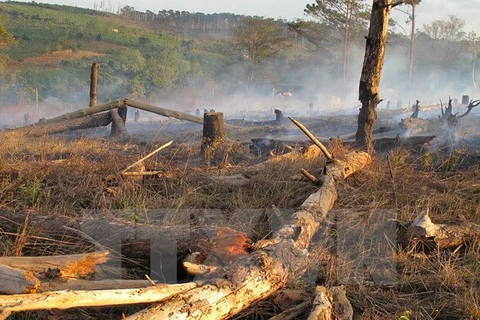Hanoi (VNA) – The violations of the endangered species act in Vietnam will face higher punishments as prescribed in the 2015 revised Penal Code, which is scheduled to take effect from July 1, 2016, said an officer from the Ministry of Public Security.
Lieutenant General Tran Van Ve, Deputy Director General of the General Police Department under the Ministry of Public Security (MoPS), was speaking at the United Nations in Vietnam’s press conference in Hanoi on June 1, which marked this year’s World Environment Day whose theme is “Zero tolerance for the illegal trade in wildlife”.
Ve reported that the fight against illegal species trafficking has always received instructions from the Party and State. The Government has, on its part, issued many documents on State management, prevention and fight against wildlife trafficking, particularly Instruction No 03/CT-TTg issued on February 20, 2014.
The MoPS has formed specialised forces to combat wildlife trade and are responding effectively to campaigns launched by international organisations and Interpol.
Speaking at the event, Pratibha Mehta, UN Resident Coordinator in Vietnam, stressed that illegal trade in wildlife has been pushing many species to the brink of extinction while causing risks to environment, economy, development and security.
Reports and data show the hunting, transport and illegal trade of ivory, rhino horn and tiger-based products have led these iconic species to the verge of extinction.
Mehta said in a breakthrough resolution issued in 2015, the UN General Assembly called on countries to pronounce the trade in wildlife a dangerous crime, and the UN is implementing an ambitious agenda to have the trade in wildlife recognised as a dangerous crime and a threat to sustainable development.
The UN’s new development goals incorporate a clear focus on protecting the harmony of ecosystems by targeting environmental crimes both on land and at sea.
Appreciating the Vietnamese government’s clear perception of challenges and step-by-step approach to solving the trade in wildlife, Mehta affirmed the UN in Vietnam has been closely working with the Vietnamese government, and local and international organisations in the fight against crimes violating the endangered s pecies act .
Christopher Batt, representative from the United Nations on Drugs and Crime in Vietnam, said Vietnam’s functional agencies need to coordinate to carry out comprehensive investigations with inter-sector investigation teams.
The country should intensify international law to forbid and criminalise the possession of any wild species, organs or products hunted and traded illegally, regardless of the crime taking place in Vietnam or anywhere else in the world.
Customs officials and border guards need to improve their capability to detect the illegal trade in wildlife at border gates. They should also boost international cooperation.-VNA























